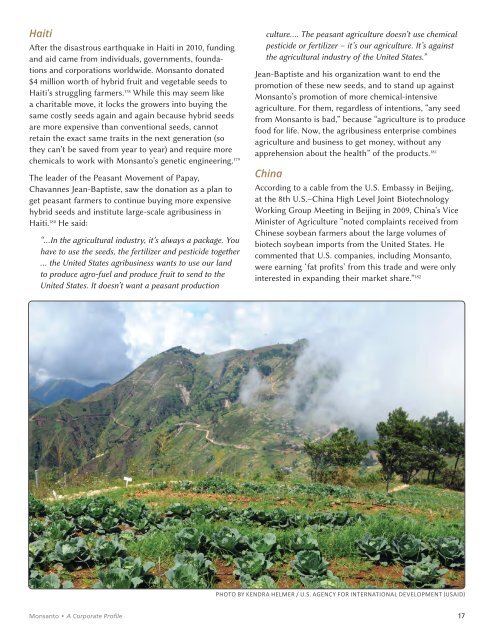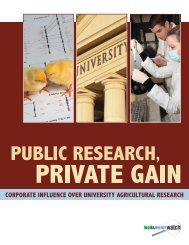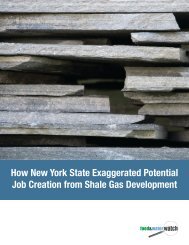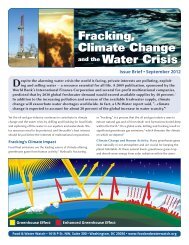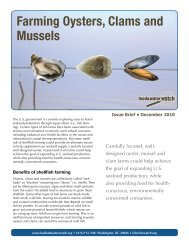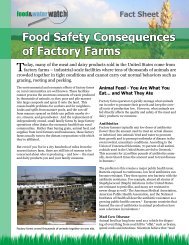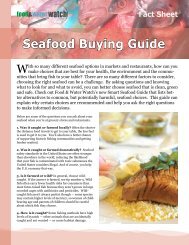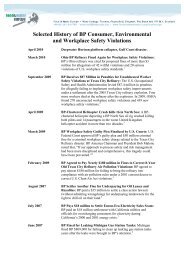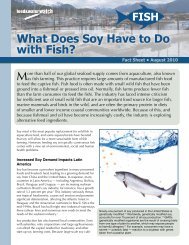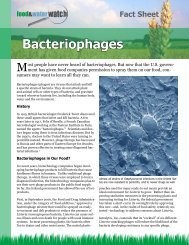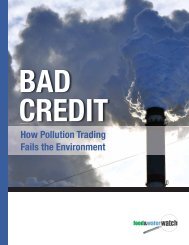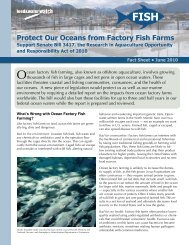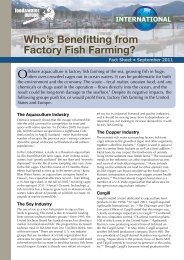Monsanto - Food & Water Watch
Monsanto - Food & Water Watch
Monsanto - Food & Water Watch
Create successful ePaper yourself
Turn your PDF publications into a flip-book with our unique Google optimized e-Paper software.
Haiti<br />
After the disastrous earthquake in Haiti in 2010, funding<br />
and aid came from individuals, governments, foundations<br />
and corporations worldwide. <strong>Monsanto</strong> donated<br />
$4 million worth of hybrid fruit and vegetable seeds to<br />
Haiti’s struggling farmers. 178 While this may seem like<br />
a charitable move, it locks the growers into buying the<br />
same costly seeds again and again because hybrid seeds<br />
are more expensive than conventional seeds, cannot<br />
retain the exact same traits in the next generation (so<br />
they can’t be saved from year to year) and require more<br />
chemicals to work with <strong>Monsanto</strong>’s genetic engineering. 179<br />
The leader of the Peasant Movement of Papay,<br />
Chavannes Jean-Baptiste, saw the donation as a plan to<br />
get peasant farmers to continue buying more expensive<br />
hybrid seeds and institute large-scale agribusiness in<br />
Haiti. 180 He said:<br />
“…In the agricultural industry, it’s always a package. You<br />
have to use the seeds, the fertilizer and pesticide together<br />
… the United States agribusiness wants to use our land<br />
to produce agro-fuel and produce fruit to send to the<br />
United States. It doesn’t want a peasant production<br />
culture…. The peasant agriculture doesn’t use chemical<br />
pesticide or fertilizer – it’s our agriculture. It’s against<br />
the agricultural industry of the United States.”<br />
Jean-Baptiste and his organization want to end the<br />
promotion of these new seeds, and to stand up against<br />
<strong>Monsanto</strong>’s promotion of more chemical-intensive<br />
agriculture. For them, regardless of intentions, “any seed<br />
from <strong>Monsanto</strong> is bad,” because “agriculture is to produce<br />
food for life. Now, the agribusiness enterprise combines<br />
agriculture and business to get money, without any<br />
apprehension about the health” of the products. 181<br />
China<br />
According to a cable from the U.S. Embassy in Beijing,<br />
at the 8th U.S.–China High Level Joint Biotechnology<br />
Working Group Meeting in Beijing in 2009, China’s Vice<br />
Minister of Agriculture “noted complaints received from<br />
Chinese soybean farmers about the large volumes of<br />
biotech soybean imports from the United States. He<br />
commented that U.S. companies, including <strong>Monsanto</strong>,<br />
were earning ‘fat profits’ from this trade and were only<br />
interested in expanding their market share.” 182<br />
<br />
<strong>Monsanto</strong> 17


